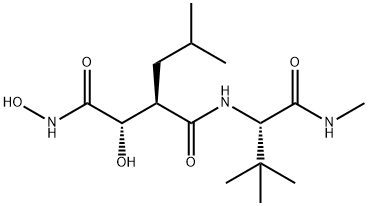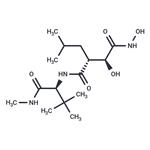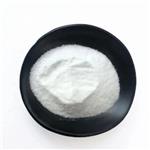Uses
Marimastat acts as a matrix metalloproteinase inhibitor in the treatment of various cancers, and pathological occurrences such as arthritis and atherosclerosis.
Uses
Marimastat has been used as an inhibitor of:
- metalloproteinase 2/9 (MMP2/9), to study its effects on exercise-mediated interleukin-6 (IL-6) release in mice
- metalloproteinase, to determine protease activity in Pseudomonas aeruginosa cultures
- metalloproteinase 10 (MMP10), to study its effect on monoclonal antibody H3 binding to MMP10
Uses
Antineoplastic (matrix metalloproteinase inhibitor).
Definition
ChEBI: Marimastat is a secondary carboxamide resulting from the foraml condensation of the carboxy group of (2R)-2-[(1S)-1-hydroxy-2-(hydroxyamino)-2-oxoethyl]-4-methylpentanoic acid with the alpha-amino group of N,3-dimethyl-L-valinamide. It has a role as an antineoplastic agent and a matrix metalloproteinase inhibitor. It is a secondary carboxamide and a hydroxamic acid.
General Description
An orally active peptidyl hydroxamate-based broad-spectrum MMP inhibitor (IC
50 in nM = 5, 6, 200, 20, 2, 1.8 and 3.8 for MMP-1, -2, -3, -7, -8, -14 and TACE, respectively) that targets both the substrate binding site and the active-site Zn
2+. Marimastate is widely used in studying the involvement of MMPs in various cellular and pathological processes both
in vitro and
in vivo.
Biological Activity
Broad spectrum inhibitor of matrix metalloprotease (MMP) (IC 50 values are 3, 5, 6, 9 and 13 nM for MMP-9, MMP-1, MMP-2, MMP-14 and MMP-7 respectively). In vivo inhibits peritoneal dissemination of human gastric cancer cells through inhibition of tumor angiogenesis.
Biochem/physiol Actions
Marimastat is a broad spectrum matrix metalloprotease (MMP) inhibitor




